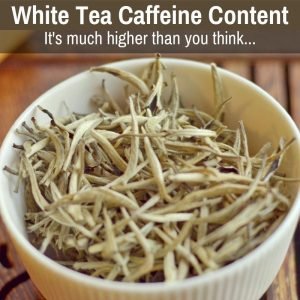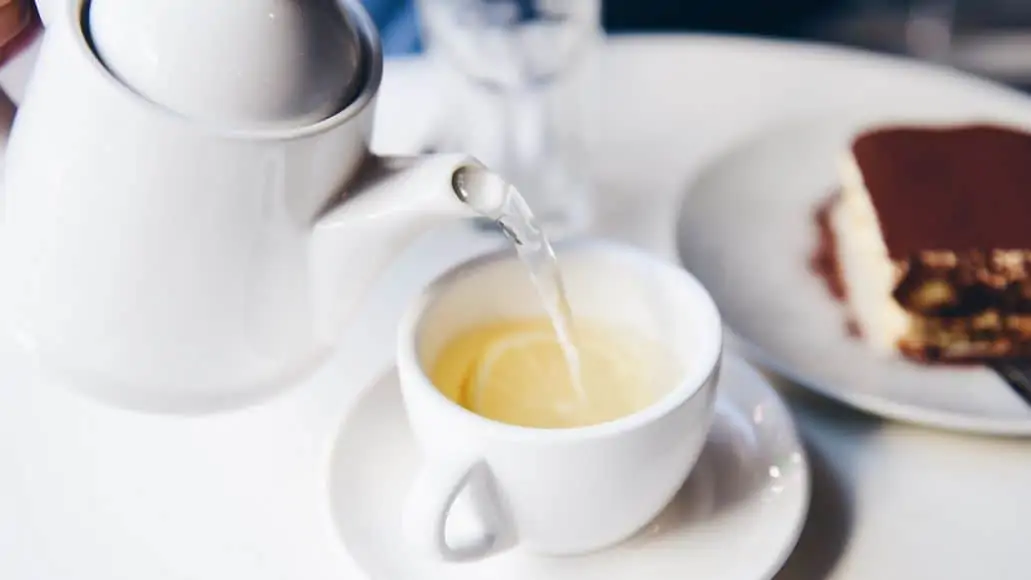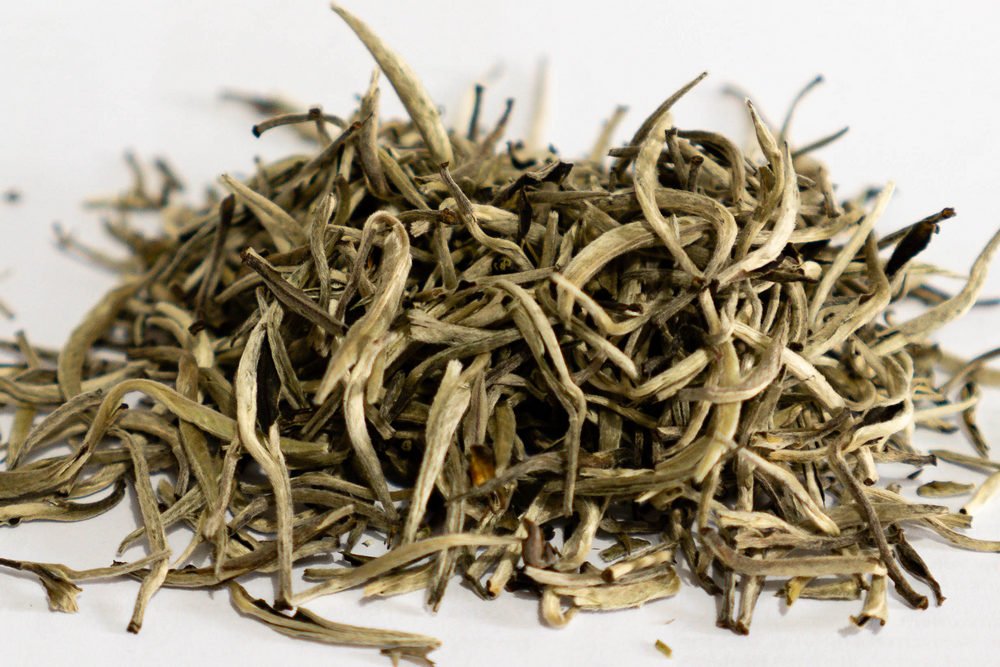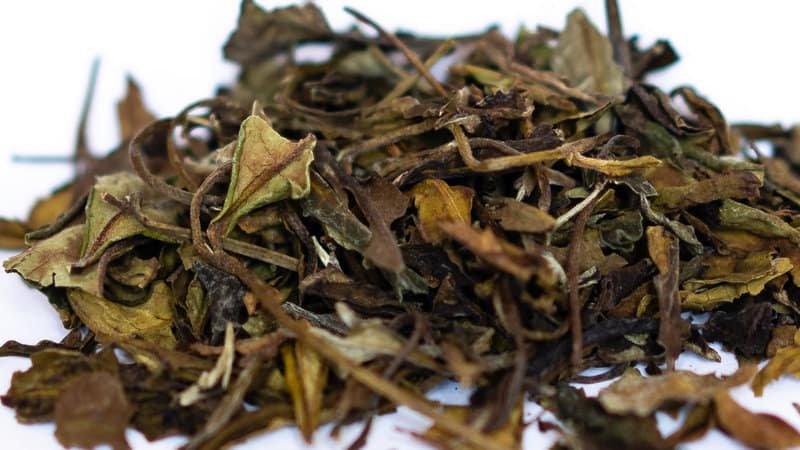
Don’t believe the hype.
Do a quick Google search for white tea caffeine or something similar.
What did you find?
Numerous websites, many of them even tea shops, that state white tea has less caffeine than green tea, which has less than black tea.
And it’s not just websites and tea shops. Even the US Department of Agriculture has made similar statements.
So what’s the problem?
It simply isn’t true, that’s what!
Sure some white teas may have less caffeine than some black teas, but in many cases, it is the exact opposite.
The highest quality white tea actually has more caffeine than most teas.
The truth is: the type of tea has no bearing on the caffeine content of that tea.
Instead, how much caffeine a tea has depends on factors like the strain the leaves come from, how young or old the leaves were when the were picked, and the way the were processed.
We’ll look at all that in a minute. First lets see why so many sources falsely claim that white tea has less caffeine.
Caffeine Content Of White Tea
Generally, tea contains about 15 to 70 mg of caffeine per 8 ounce cup (far less than coffee). There is a lot of variation in there, but the variation exists between individual teas, not between categories of teas, i.e. green tea, black tea, white tea, oolong tea, pu’er tea and yellow tea.
The truth is, it is difficult, even impossible, to say how much caffeine white tea (or any given tea) might have, without actually testing it in a lab.

What we can do is examine which factors have the largest effect on caffeine content and then make an educated guess from there about a given tea.
So lets look at the main factors affecting the amount of caffeine in a tea.
Factors Determining The Caffeine Content Of Tea
These are the 4 major factors that have the most impact:
- Age of the leaves: teas made from young leaves (like most white tea) and from the leaf buds have more content than teas made from more mature leaves; caffeine acts as a natural insecticide and younger leaves are more vulnerable to insects, so they need more protection
- Processing of the leaves: roasting the tea leaves to stop the oxidation process, instead of steaming them, leads to a lower caffeine level
- The variety of tea plant: any type of tea can be made from any variety of plant, but certain regions grow specific varieties, leading to teas from those regions having more or less caffeine on average
- Brewing process: using more tea leaves and/or steeping them for a longer time increases the caffeine content of the resulting brew
Based on this, we can make some generalizations about the level of caffeine contained in certain teas.
Teas with high caffeine
Teas made from young leaves and buds contain more caffeine, as do teas that are steamed and not roasted. Some examples are:
- Matcha (contains the whole leaves, so it has by far the most caffeine)
- White Hair Silver Needle (made from the leaf tips)
- Golden Monkey (made from the leaf tips)
- Yunnan Gold (made from young leaves)
- Jasmine Silver Needle (made from the leaf tips)
- Gyokuro (plant variety high in caffeine and steamed)
Teas with low caffeine
Teas made from more mature leaves and roasted teas have less caffeine. Some examples are:
- Houjicha (roasted)
- Big Red Robe (made from mature leaves and roasted)
- Lapsang Souchong (made from mature leaves)
- Tie Guan Yin (made from mature leaves and roasted)
- Shui Xian (made from mature leaves and roasted)
Types Of White Tea And Their Caffeine Content
The most famous white tea made the list of high-content teas above, so obviously we know where it stands.
White Hair Silver Needle Tea

The highest quality white tea is made exclusively from the young leaf tips. This gives it its mild taste and high quality, but also gives it a much higher caffeine content than average.
It contains more than just about any black tea except for Golden Monkey and Golden Needle, which are made from the same young leaf tips. Of course, steeping time plays a role, too.
And people tend to steep black tea longer, so the cup ends up with more caffeine. But when it comes to white tea vs green tea, white tea generally has more caffeine, apart from matcha green tea.
Learn more about this white tea here.
White Peony Tea

White peony also contains the leaf tips, but mixes them with the next to leaves on the stem. All leaves used are young, but not quite as young as the ones use in White Hair Silver Needle tea. For that reason, white peony tea has a lower amount of caffeine than Silver Needle tea, but still higher than average.
Learn more about white peony here.
Shou Mei Tea
Shou Mei contains a few young buds and then a few leaves that come after the ones used for White Peony and are thus older. As a result, it has less caffeine than the other types of white tea.
Why Does Everyone Claim White Tea Has Less Caffeine?
I’m not completely sure how this myth started, but I’m guessing it has something to do with the flavor. White tea is the mildest of all the teas made from true tea plants (i.e camellia sinensis), which might suggest that it is also mild when it comes to caffeine levels.
Back when white tea first started making inroads in the west, I could see that someone assumed it had less caffeine based on the flavor and wrote an article making that claim.
As is so often the case online, other bloggers probably saw that claim, took it at face value, and repeated it on their sites. Doing actual research takes work, after all.
And now we’ve reached a point where thousands of websites continue to spread this misinformation. So let’s see what the actual truth is.
This false idea about white tea could also come from the location. Many white teas come from Fujian province and tea growers in Fujian favor a variety of tea plant that contains less caffeine naturally. Perhaps that led people to falsely connect the two unrelated factors in their heads.
No matter where the idea came from, the important thing to remember is that it is false. White tea does not contain less caffeine than other types of tea simply because it is white and, on average, it actually contains more caffeine that most teas.
If you want to try some white tea, but are not sure where you can get good quality varieties, check out this post.
White Tea Caffeine Content: Final Thoughts
White tea tends to contain more caffeine than most other types of tea, though this can always be mitigated by using a shorter steeping time or fewer leaves.
The main takeaway is to not be fooled by the false information on so many health sites. White tea leaves are higher in caffeine than other types and not lower. The resulting tea is usually high in caffeine as well, whether it is plain or mixed with herbs or fruit like black currant.
That’s a very useful mythbusting. Thanks.
Do you have a works sited page or references? You’re right every other website states white tea is low in caffeine. Do you know exactly how much caffeine a serving of white peony has? I can’t imagine anything higher than black tea having any type of health benefits.
Thank you
No, I have no idea how much caffeine individual teas have. No one does, it seems. They just don’t test individual types of tea for their caffeine content. And the health benefits are largely the same for all types of tea made from the actual tea plant. I’d just drink whichever variety you like best. And if you’re looking for one with a lot of caffeine, then go with matcha.
I’m looking for a low caffeine tea.
In that case, hoijicha would a good choice: http://letsdrinktea.com/types-of-tea/green-tea/houjicha/
Most oolong teas are also a bit lower in caffeine.